Donald Trump inaugural attracts record $107 million in donations
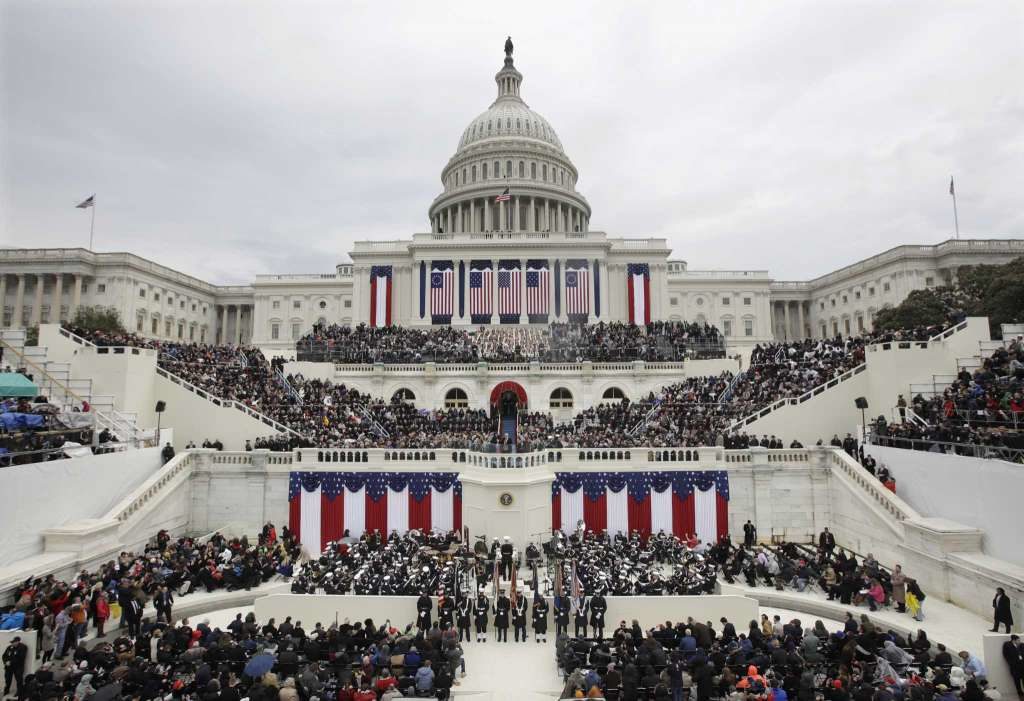
President Donald Trump raised $107 million for his inaugural festivities, nearly double the previous record set by President Barack Obama eight years ago. Trump’s inaugural committee is due to file information about those donors with the Federal Election Commission and said it would do so Tuesday. The committee doesn’t need to publicly disclose how the money was spent. Trump placed no restrictions on the amount of money donors could give. Obama limited contributions to $50,000 in 2009 but lifted that cap four years later. After raising about $55 million in 2009, Obama used excess funds to help pay for the White House Easter egg roll and other events, his former inaugural committee chief executive officer said. Trump promised to give any extra money to charity, but didn’t specify which ones. Republished with permission of The Associated Press.
Alabama ranks as one of America’s least green states

According to a new study, Alabama is America’s 10th least green state. As in, least friendly to the environment. With Earth Day just days away, Personal finance website WalletHub conducted the study to showcase the states “doing right by Mother Earth.” Their analysis of “2017’s Greenest States” examines all 50 states across three key dimensions — environmental quality, eco-friendly behaviors and climate-change contributions — that “speak to the current health of the environment and the environmental impact of residents’ daily habits. Analysts evaluated those dimensions using 20 relevant metrics from water and soil quality to green buildings carbon dioxide emissions per capita, among other eco-friendly behaviors. Here’s how Alabama ranked: Total Score: 48.02 Environmental quality rank: 34 Eco-friendly behaviors rank: 46 Climate change contributions rank: 33 Earth Day is Saturday, April 22. Here’s how Alabama compares to the rest of the country: Source: WalletHub
State Senate to vote on nixing concealed carry permits

The Alabama Senate will vote on a legislation Tuesday that would allow people to lawfully carry a concealed handgun without needing to get a permit first. Senate Bill 24, sponsored by Tuscaloosa-Republican state Rep. Gerald Allen, would remove restrictions on Second Amendment rights and would codify constitutional carry as the law of the land. The bill however, has been heavily criticized by some of the state’s law enforcement officials, including the Alabama Sheriff’s Association and the Alabama County Commissioners Association, who say concealed carry permits are necessary for public safety. “It’s a bad piece of legislation. It’s probably one of the worst we’ve seen,” Butler County Sheriff Kenny Harden told AlabamaNews.net. Concealed carry permits are typically only granted should an individual pass a background check. SB24 would in essence allow anyone who has previously failed a background check and denied a carry permit to carry a gun. But Rep. Allen says the bill is all about the Second Amendment and U.S. Constitution, which he says protects “the right of the people to keep and bear arms” for the “security of a free state.” He doesn’t think Alabamians should be required to pay their hard-earned dollars to exercise those rights. “Alabama should be leading the way on constitutional gun rights. More than ten states across the country already allow their citizens to carry guns without a permit. It’s time we give our citizens the right to bear arms without first seeking the government’s permission,” Allen said. “We already allow open carry without a permit, and there is no logical reason for continuing to require a permit for concealed carry.” The National Rifle Association (NRA) also supports the bill. “The law-abiding citizens of Alabama have a fundamental, constitutional right to keep and bear arms,” said the NRA. “The NRA supports legislation that would provide law-abiding citizens greater freedom to protect themselves in the manner that best suits their needs, while still keeping guns out of the hands of violent criminals.” Senate President Pro Tem Del Marsh said he expects the Republican-controlled Senate to pass the measure Tuesday. According to the Law Center to Prevent Gun Violence, 11 states —Alaska, Arizona, Idaho, Kansas, Maine, Mississippi, Missouri, New Hampshire, Vermont, West Virginia and Wyoming — allow people to carry concealed weapons in public without a permit.
Club for Growth singles out Martha Roby in border tax fight
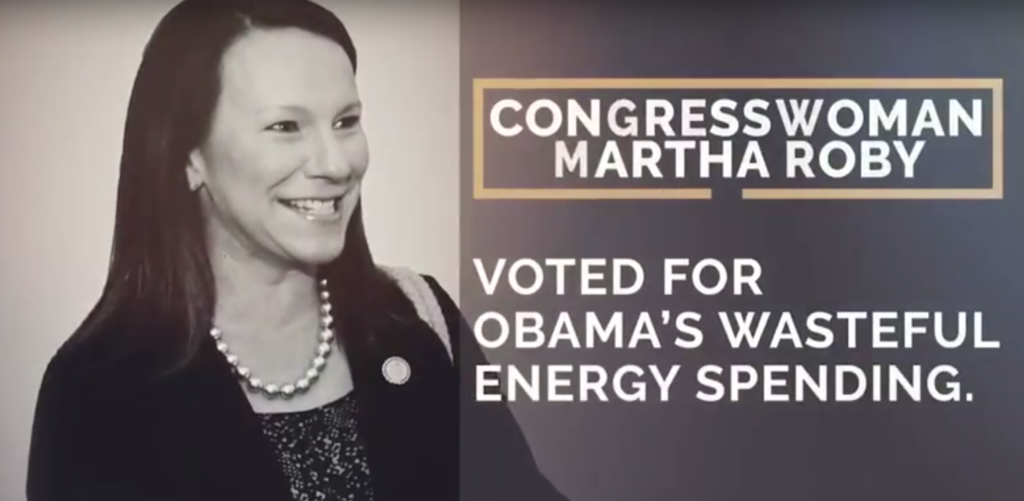
Alabama 2nd District Republican Congresswoman Martha Roby is one of four representatives being targeted in a new TV and digital ad released this week by Club for Growth. The free-market conservative group’s ad focuses on the border adjustment tax, or BAT, being tossed around by House Republicans. The plan would levy a 20 percent tax on imports while giving tax breaks to companies that export goods, which opponents say would quickly raise prices on many goods Americans depend on. The BAT is being considered as part of a strategy that would balance the keep government revenue steady if lawmakers stick to their plan of cutting the corporate tax rate from 35 percent to 20 percent. The ad calls Roby out for votes made while President Barack Obama was in office and says her refusal to oppose the BAT tax could lead to a spike in gas, clothing, food and school supply costs that could cost Alabama families up to $1,700 a year. “Congresswoman Martha Roby proudly voted for Obama’s wasteful energy spending, but she’s shy about fighting a trillion-dollar tax hike Congress is cooking up,” the ad narrator said. The ad closes by asking viewers to call Roby’s office and tell her to oppose the BAT. Club for Growth is spending $500,000 on the campaign which, in addition to Roby, is going after Tennessee Republican Rep. Diane Black, South Carolina Republican Rep. Tom Rice and Texas Republican Rep. John Culberson. Watch the ad below:
Pentagon’s Jim Mattis discussing war aims in Mideast this week
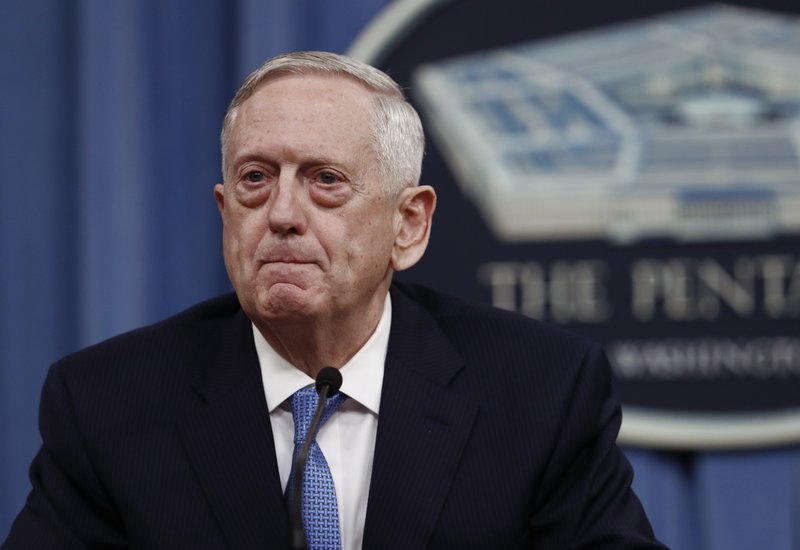
Defense Secretary Jim Mattis is looking to the Middle East and North Africa for broader contributions and new ideas to fight Islamic extremism as the Trump administration fleshes out its counterterrorism strategy. His trip to the region, which began with his departure Monday night, includes stops with longstanding allies Saudi Arabia and Israel, and new partners like Djibouti. As the administration enhances its efforts, Mattis has made a point of consulting counterparts around the world. His goals include expanding the American-led coalition against the Islamic State group in Iraq and Syria, but also combatting al-Qaida, whose Yemen branch is posing particular worry as it uses ungoverned spaces in the Arab world’s poorest country to plan attacks on the United States. In announcing Mattis’s trip, the Pentagon said last week he would be discussing ways to “defeat extremist terror organizations.” Mattis is starting his travels Tuesday in Riyadh, where he is expected to meet senior Saudi leaders. Saudi Arabia is leading a coalition that is fighting Iran-backed rebels in Yemen. The coalition’s airstrikes began two years ago but haven’t driven the Houthi rebels from the capital and large parts of Yemen they still control. The Trump administration is considering providing intelligence, aerial refueling and other military assistance to the United Arab Emirates, which is helping the Saudis. The U.N. says some 50,000 civilians have been killed or wounded in the three-year stalemate. Worries about IS aren’t limited to Syria and Iraq. Its influence has spread to Libya and elsewhere in North Africa. Mattis told a Pentagon news conference last week that he hoped to bring as many other nations as possible into the administration’s new strategy, which involves diplomatic and other non-military features. He said that plan was still in “skeleton form,” though it was being “fleshed out.” The Middle East’s landscape is getting more complicated. Syria’s alleged chemical weapons attack on April 4 prompted a U.S. cruise missile strike, temporarily slowing the pace of Washington’s air campaign against IS in northern Syria. And a U.S. airstrike April 11 killed 18 fighters associated with a U.S.-supported Syrian rebel group. Central Command said the U.S. strike was misdirected. Also last week, U.S. forces in Afghanistan struck an IS stronghold near the Pakistani border with the 11-ton “mother of all bombs,” the largest U.S. non-nuclear bomb ever used in combat. The Middle East is familiar turf for Mattis, a Marine veteran of the Iraq war who rose to four-star rank. He finished his military career as head of Central Command, which directs U.S. military operations across the Middle East and Central Asia. On his weeklong trip, Mattis also is scheduled to visit Egypt and Qatar, the small Arab country that hosts the U.S. military’s main Mideast air operations center. It will be his first trip to these countries since taking office in January. He also will make a brief stop at Camp Lemonnier in Djibouti in the Horn of Africa, which the U.S. uses to fly sensitive drone missions over Somalia and Yemen. Mattis visited Iraq in February on his first trip to the Middle East as Pentagon chief. Republished with permission of The Associated Press.
Gov. Kay Ivey schedules Senate special election in line with state law
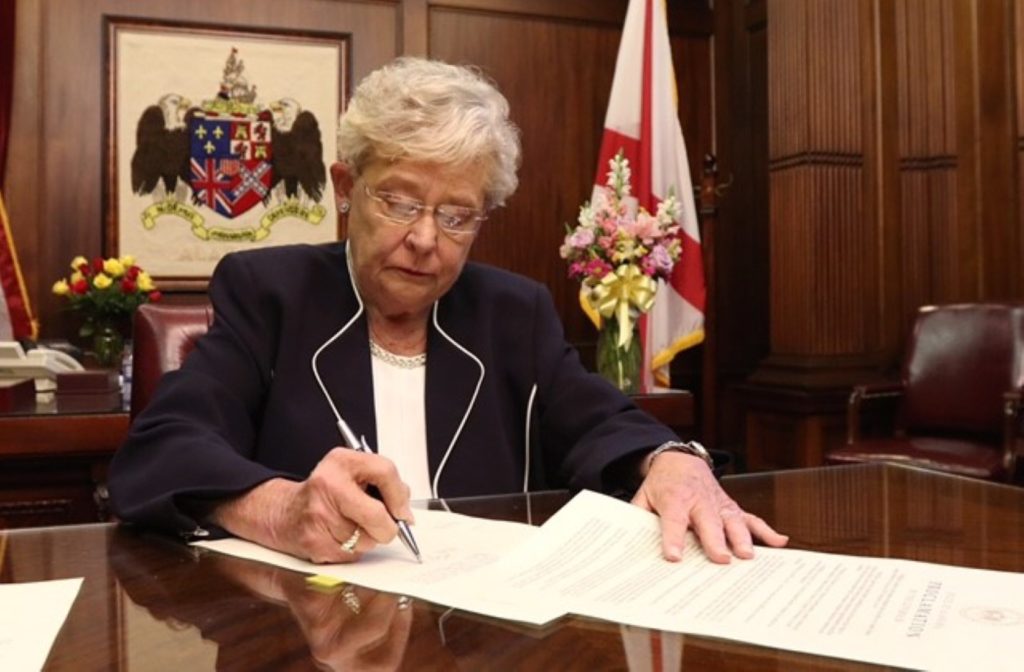
Alabama Gov. Kay Ivey signed a proclamation Tuesday morning to reschedule the special election date for the U.S. Senate seat vacated by now-Attorney General Jeff Sessions. The new primary date is Aug. 15, with a runoff set for Sept. 26; the general election is Dec. 12, a year ahead of the previously scheduled election date. In February, Gov. Robert Bentley temporarily appointed then-Attorney General Luther Strange to the Senate seat until Alabama could hold a special election. Bentley originally scheduled the special election to coincide with the 2018 regular election cycle, a primary in June and general election in November. “I promised to steady our ship of state. This means following the law, which clearly states the people should vote for a replacement U.S. Senator as soon as possible,” Ivey said in a statement. “The new US Senate special election dates this year are a victory for the rule of law.” Ivey signed the proclamation at 9:21 a.m. “This is not a hastily-made decision,” Ivey added. “I consulted legal counsel, the finance director, Speaker [Mac] McCutcheon, Senate President Del Marsh, and both budget chairmen since the cost to the General Fund could be great. However, following the law trumps the expense of a special election.” Alabama statute says that if a Senate seat vacancy occurs more than four months before a general election, the governor is required to call a special election “forthwith.” Bentley interpreted “forthwith” to mean an announcement, not the actual election. Senator Strange is taking the change of date in stride. “As I’ve said for months, I’m a candidate and I’m ready to run whether the election is next month or next year,” said Strange. “As the only announced candidate for this office, I will spend the next several months being the best Senator I can be, upholding Alabama values and working with President Donald Trump to drain the swamp and help make America great again. The people of Alabama deserve nothing less and ultimately it will be up to them to decide who will represent them in Washington.”
White House defends transparency after visitor log reversal
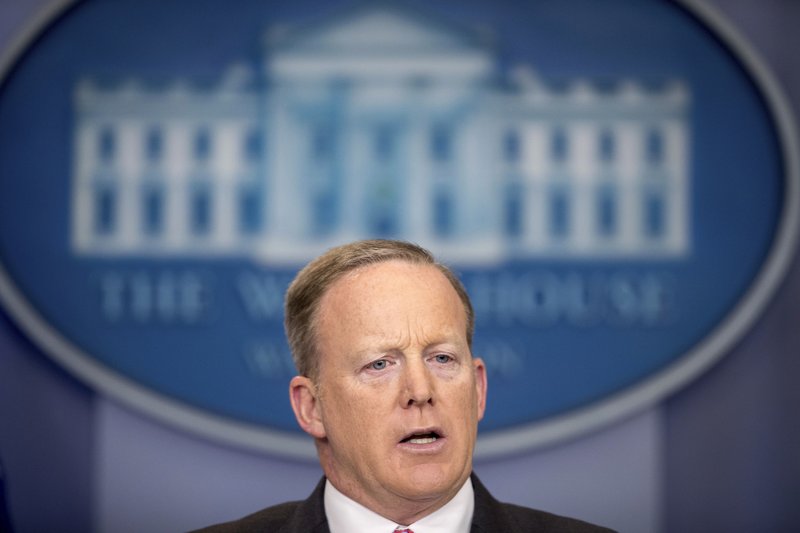
The White House defended its commitment to transparency Monday amid criticism of its decision to keep visitors’ records secret and new calls for President Donald Trump to release his federal tax returns. Government watchdog groups argue Trump is preventing the public from learning basic details about his financial ties and blocking information about the groups and individuals that are trying to influence the White House. The Obama administration released 6 million White House visitor records over eight years. On Monday, White House spokesman Sean Spicer downplayed those disclosures because national security and law enforcement reasons were used to exclude certain visits — despite the fact that the Trump White House has used national security and privacy concerns to justify keeping all visitor information under wraps. Spicer said the Obama White House approach amounted to “faux” transparency. “It’s not really being transparent when you scrub out the names of the people that you don’t want anyone to know were here,” Spicer said. The Obama administration initially fought attempts by Congress and conservative and liberal groups to obtain visitor records. But after being sued, it voluntarily began disclosing the logs in December 2009, posting records every three to four months. It continued to release the records even though a federal appeals court ruled in 2013 that the logs can be withheld under presidential executive privilege. Trump has long faced questions about secrecy and transparency given his refusal to release his federal tax returns, a decision that broke decades of tradition for both presidents and presidential candidates. White House aides have also provided few details about Trump’s activities and meetings during his numerous weekend trips to Florida. Thousands of protesters marched across the country Saturday demanding anew that Trump release his tax returns. But the protests did little to change Trump’s thinking: Spicer maintained that Trump was unable to make the information public because he is under audit, despite the fact that tax experts say an audit would not prevent him from releasing his taxes. Asked whether Trump is simply never going to release his taxes, Spicer said, “We’ll have to get back to you on that.” The White House defended Trump’s overall approach to transparency, noting that the president often opens portions of his meetings with business executives and other visitors to journalists. He also takes questions from reporters on a fairly regular basis, including during news conferences with visiting foreign leaders. “We bring people in, we release participant lists, we give press the opportunity to come into the room, see everybody who’s there, hear part of the discussion,” Spicer said. However, the White House has been tight-lipped about Trump’s activities when he travels to his properties in Florida — his Mar-a-Lago resort and a nearby private golf club. Aides rarely confirm when the president is golfing, even when photos of him on the course pop up on social media. During his recent Easter visit to Florida, the president spent two days at Trump International Golf Course. The White House provided no information about his activities, though CNN obtained images of the president golfing. Republished with permission of The Associated Press.
Donald Trump targets visas program for highly skilled workers
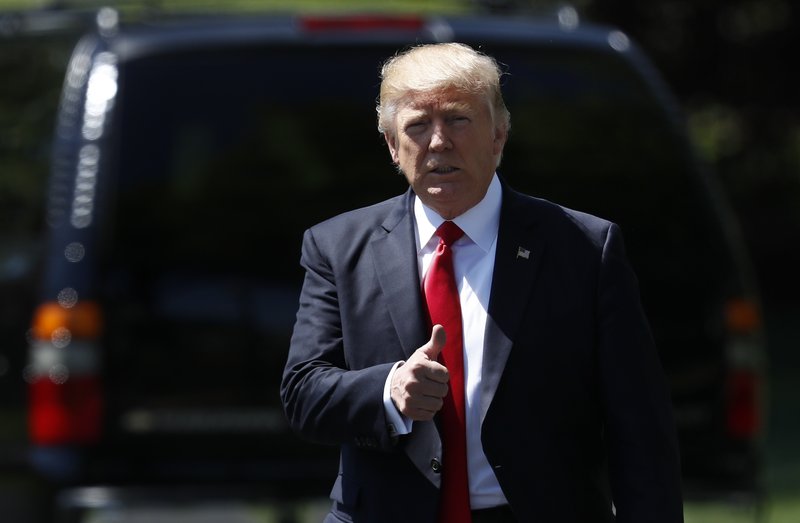
President Donald Trump hopes to revive the economic populism that helped drive his election campaign on Tuesday, signing an order in politically important Wisconsin to tighten rules on technology companies bringing in highly skilled foreign workers. At a the headquarters of a big-name tool manufacturer, Trump is expected to sign an order aimed at curbing what his administration says are abuses in a visa program used by U.S. technology companies that harm American workers. Dubbed “Buy American, Hire American,” the directive follows a series of recent Trump reversals on economic policies. The president is to sign the directive at Snap-on Inc. in Kenosha, Wisconsin, a state he narrowly carried in November on the strength of support from white, working class voters. Trump currently has only a 41 percent approval rating in the state. He is targeting the H-1B visa program, which the White House says undercuts American workers by bringing in large numbers of cheaper, foreign workers, driving down wages. The tech industry has argued that the H-1B program is needed because it encourages students to stay in the U.S. after getting degrees in high-tech specialties — and companies can’t always find enough American workers with the skills they need. Trump has traveled to promote his agenda less than his recent predecessors. White House spokesman Sean Spicer said he wanted to visit “a company that builds American-made tools with American workers.” The new order would direct U.S. agencies to propose rules to prevent immigration fraud and abuse in the program. They would also be asked to offer changes so that H-1B visas are awarded to the “most-skilled or highest-paid applicants,” said administration officials who spoke only on the condition of anonymity despite the president’s frequent criticism of the use of anonymous sources. The officials said the order also seeks to strengthen requirements that American-made products be used in certain federal construction projects, as well as in various federal grant-funded transportation projects. The commerce secretary will review how to close loopholes in existing rules and provide recommendations to the president. The order specifically asks the secretary to review waivers of these rules in free-trade agreements. The waivers could be renegotiated or revoked if they are not benefiting the United States. Trump’s visit to Wisconsin takes him to the congressional district of House Speaker Paul Ryan, who won’t be joining the president because he’s on a congressional trip visiting NATO countries. Trump campaigned on populist promises to stand up to China, which he contended was manipulating its currency and stealing American jobs, and to eliminate the Export-Import bank, which he billed as wasteful subsidy. In a series of interviews last week, Trump reversed himself on both positions And while he has long pledged to support American goods and workers, his own business record is mixed. Many Trump-branded products, like clothing, are made overseas. And his businesses have hired foreign workers, including at his Palm Beach club Mar-a-Lago. During his campaign, Trump said at one point that he supported high-skilled visas, then he said he opposed the program. At one debate, he said: “It’s very bad for our workers and it’s unfair for our workers. And we should end it.” Potential changes could be administrative or legislative and could include higher fees for the visas, changing the wage scale for the program or other initiatives. Critics say the program has been hijacked by staffing companies that use the visas to recruit foreigners — often from India — who will work for less than Americans. The staffing companies then sell their services to corporate clients. Employers, including Walt Disney World and the University of California, San Francisco, have laid off tech employees and replaced them with H-1B visa holders. U.S. workers are sometimes asked to train their replacements to qualify for severance packages. Ronil Hira, a professor in public policy at Howard University and a critic of the H-1B program, said Trump’s planned order is “better than nothing.” But he added, “It’s not as aggressive as it needs to be.” Trump carried Wisconsin in November by under 23,000 votes — less than 1 percentage point — making him the first Republican to win the state since 1984. He campaigned on the promise of returning manufacturing jobs that have been lost in Upper Midwest states. Snap-on makes hand and power tools, diagnostics software, information and management systems, and shop equipment for use in various industries, including agriculture, the military and aviation. It has eight manufacturing sites in North America and employs about 11,000 people worldwide. Republished with permission of The Associated Press.
Richard Shelby introduces legislation to establish flat tax

Filing your taxes getting you down? A simplified tax code may soon be a reality if flat tax legislation sponsored by Alabama’s senior senator can pass in Washington. As a few hundred thousand Americans file their last-minute tax returns on Tuesday, Alabama U.S. Senator Richard Shelby has introduced S.893, which would repeal the current tax code and replace it with a17 percent flat tax on all income, both personal and business. Known as the Simplified, Manageable, and Responsible Tax (SMART) Act, the bill also repeals estate taxes, gift taxes, and the Alternative Minimum Tax (ATM). The only exemptions would be personal exemptions of: $14,590 for a single person $18,630 for a head of household $29,190 for a married couple filing jointly $6,290 for each dependent These allowances would also be indexed to the consumer price index in order to prevent inflation from raising the tax burden. Additionally, as a way to prevent the double-taxation of income, earnings from savings would not be included as taxable income – resulting in an immediate tax cut for virtually all taxpayers. “On Tax Day, the American people are reminded that our nation’s tax code is unnecessarily complex, confusing, and inefficient,” said Shelby. “The SMART Act is a straightforward solution that would require taxpayers to only file a simple postcard size return, which would save Americans time and money. The SMART Act would also allow businesses to redirect resources away from tax compliance and instead focus on expanding their businesses and creating jobs.” By closing loopholes for individuals and businesses, the SMART Act endeavors to create broad-based lower tax rates that would give American individuals and businesses a competitive edge, create and retain jobs in the United States, and curb offshoring.
Ivanka Trump’s biz prospers as politics mixes with business
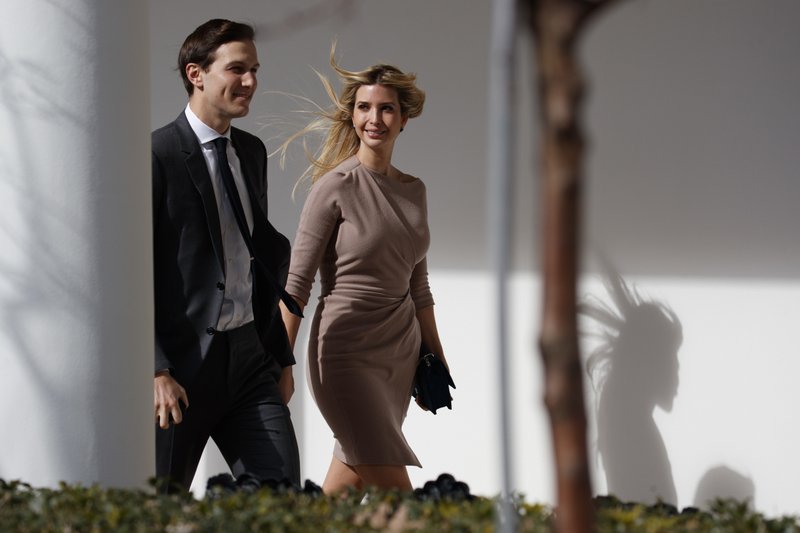
On April 6, Ivanka Trump‘s company won provisional approval from the Chinese government for three new trademarks, giving it monopoly rights to sell Ivanka brand jewelry, bags and spa services in the world’s second-largest economy. That night, the first daughter and her husband, Jared Kushner, sat next to the president of China and his wife for a steak and Dover sole dinner at Mar-a-Lago. The scenario underscores how difficult it is for the president’s daughter, who has tried to distance herself from the brand that bears her name, to separate business from politics in her new position at the White House. As she crafts a political career from her West Wing office, her brand is flourishing, despite boycotts and several stores limiting her merchandise. U.S. imports, almost all of them from China, shot up an estimated 166 percent last year, while sales hit record levels in 2017. The brand, which Ivanka Trump still owns, says distribution is growing. It has launched new activewear and affordable jewelry lines and is working to expand its global intellectual property footprint. In addition to winning the approvals from China, Ivanka Trump Marks LLC applied for at least nine new trademarks in the Philippines, Puerto Rico, Canada and the U.S. after the election. The commercial currents of the Trump White House are unprecedented in modern American politics, ethics lawyers say. They have created an unfamiliar landscape riven with ethical pitfalls, and forced consumers and retailers to wrestle with the unlikely passions now inspired by Ivanka Trump’s mid-market collection of ruffled blouses, shifts and wedges. Using the prestige of government service to build a brand is not illegal. But criminal conflict-of-interest law prohibits federal officials, like Ivanka Trump and her husband, from participating in government matters that could impact their own financial interest or that of their spouses. Some argue that the more her business broadens its scope, the more it threatens to encroach on the ability of two trusted advisers to deliver credible counsel to the president on core issues like trade, intellectual property and the value of Chinese currency. “Put the business on hold and stop trying to get trademarks while you’re in government,” advises Richard Painter, who served as chief White House ethics lawyer under George W. Bush. To address ethical concerns, Ivanka Trump has shifted the brand’s assets to a family-run trust valued at more than $50 million and pledged to recuse herself from issues that present conflicts. She is also no longer running her design business and has given day-to-day responsibility to Abigail Klem, president of the brand. Meanwhile, her husband has taken steps to distance himself from his sprawling New York real estate business, divesting some of his business interests including his stake in a major Fifth Avenue skyscraper. “Ivanka will not weigh in on business strategy, marketing issues or the commercial terms of agreements,” her attorney, Jamie Gorelick, said in a statement. “She has retained authority to direct the trustees to terminate agreements that she determines create a conflict of interest or the appearance of one.” In a recent interview with CBS News, Trump argued that her business would be doing even better if she hadn’t moved to Washington and placed restrictions on her team to ensure that “any growth is done with extreme caution.” China, however, remains a nagging concern. “Ivanka has so many China ties and conflicts, yet she and Jared appear deeply involved in China contacts and policy. I would never have allowed it,” said Norman Eisen, who served as chief White House ethics lawyer under Barack Obama. “For their own sake, and the country’s, Ivanka and Jared should consider stepping away from China matters.” Instead, the first daughter and her husband have emerged as prominent interlocutors with China, where they have both had significant business ties. Last year, Kushner pursued hundreds of millions of dollars in real estate investments from Anbang Insurance Group, a financial conglomerate with close ties to the Chinese state. After media reports about the deal, talks were called off. Publicly, Ivanka Trump has taken a gracious, charming approach toward Beijing. During the Mar-a-Lago meetings, her daughter, 5-year-old Arabella, stood in a gilded room and sang a traditional Chinese song, in Mandarin, for China’s president, Xi Jinping. The video, which was lavishly praised by Chinese state media, played over 2.2 million times on China’s popular news portal qq.com. The week of the summit, 3.4 tons of Ivanka Trump handbags, wallets and blouses arrived in the U.S. from Hong Kong and Shanghai. U.S. imports of her merchandise grew an estimated 40 percent in the first quarter of this year, according to Panjiva Inc., which maintains and analyzes global shipping records. Painter, the former Bush administration lawyer, recommended full recusal from issues related to trade with China. That is likely to be difficult because trade is so deeply embedded in the US-China relationship and has been linked with other matters, like North Korea. “The danger is that with any discussion with the Chinese, one party or the other may try to bring up trade,” he said. “That’s a slippery slope that may require her or Jared to step out of the room.” Gorelick, Ivanka Trump’s attorney, said that she and her husband would steer clear of specific areas that could impact her business, or be seen as conflicts of interest, but are under no legal obligation to step back from huge swaths of policy, like trade with China. Under the rules, Trump would recuse herself from conversations about duties on clothing imported from China, Gorelick said, but not broad foreign policy. “In between, you have to assess it case-by-case,” she said. Trademarks can be signs of corporate ambition, though many countries — such as China, where “trademark squatting” is rampant — also allow for defensive filings to prevent copycats from using a brand. Trademarks pose ethical, and possibly legal, implications for government employees because they are granted by foreign states and confer the monopoly right to sell branded products in a particular country
“Tax Freedom Day” was April 9 in Alabama

Taxes are due Tuesday, and according to a new report from the Tax Foundation, Alabamians have already earned enough money this year to pay their total tax bill for 2017. In the Washington D.C.-based tax policy nonprofit’s new “Tax Freedom Day” report, the Tax Foundation determined the day when the average American hypothetically has worked enough to pay all federal, state and local taxes for the year. For the nation as a whole, that day falls on April 23 — this coming Sunday — 113 days into the year. For Alabamians, that day was April 9, making it the state with the fourth earliest Tax Freedom Day in the country. The goal of Tax Freedom Day is to help Americans understand the cost of government, and according to the report, this year Americans will collectively pay $3.5 trillion in federal taxes and $1.6 trillion in state and local taxes, for a total bill of more than $5.1 trillion, or 31 percent of the nation’s income. Meaning Americans will collectively spend more on taxes in 2017 than they will on food, clothing, and housing combined. Here’s how Alabama compares to the rest of the nation:
5 things to know about Tax Day: refunds are up, audits down
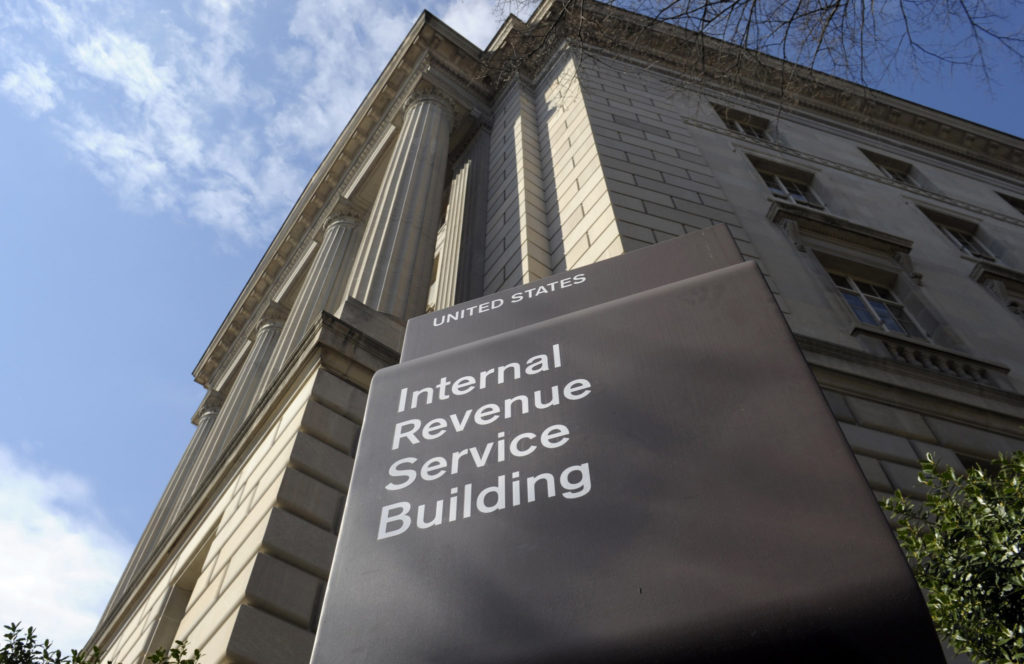
Tuesday is Tax Day, that dreaded day when millions of procrastinators rush to fulfill their civic duty by filing state and federal tax returns. But for most, it’s not that bad. Sure, the forms are complicated and yes, there is math. But tax season also generates about $300 billion in refunds, a significant boost to the U.S. economy. Five things to know about Tax Day: ___ MOST GET REFUNDS The IRS so far has processed 101 million tax returns from individuals and about 80 percent have qualified for refunds. The average refund is $2,851, an increase of $53 over last year. By the end of filing season, the IRS expects to process 150 million returns. That’s after millions file for automatic six-month extensions. ___ CHANCES OF GETTING AUDITED ARE SLIM The number of people audited by the IRS in 2016 dropped for the sixth straight year, to just over 1 million. That’s less than 1 percent of filers. The last time so few people were audited was 2004. Since then, the U.S. has added about 30 million people. The IRS blames budget cuts as money for the agency shrank from $12.2 billion in 2010 to $11.2 billion last year. But rich people beware. The higher your income, the more likely you are to be audited. Agents audited 5.8 percent of returns that reported more than $1 million in income. ___ RETURNS DOWN, REFUNDS DELAYED Tax season got off to a slow start because the IRS delayed refunds for more than 40 million low-income families as part of the agency’s efforts to fight identity theft. The delays affected families claiming the earned income tax credit and the additional child tax credit. The tax breaks are geared to benefit the working poor, and many families claim both. The tax filing season started Jan. 23. But a new law required the IRS to delay tax refunds for people claiming these credits until Feb. 15. The delay was designed to give the agency more time to screen the returns for fraud. Throughout the tax filing season, the number of tax returns processed by the IRS has been lower than last year. As of April 7, the IRS had received 104 million tax returns and processed 101 million. Both numbers are down about 3.5 percent from last year. ___ PEOPLE ILLEGALLY IN US PAY TAXES There is a common myth that people in the U.S. illegally don’t pay taxes. But data from both the IRS and the Social Security Administration says otherwise. Yes, some work in the underground economy. But in 2015, the Social Security Administration estimated that immigrants who are in the U.S. illegally paid $100 billion in Social Security payroll taxes over the previous decade. They paid the taxes even though few will ever be able to collect benefits. How does Social Security know when it receives taxes from immigrants who are in the U.S. illegally? One way is by tracking reported wages in which the Social Security number does not match the name the agency has on file. Some of these are clerical errors or unreported name changes. But the agency estimates that a majority of the wages come from immigrants who have made-up Social Security numbers or used someone else’s. Also, the IRS has issued more than 20 million Individual Taxpayer Identification Numbers (ITINs) to foreigners. The ITINs are supposed to be used by foreigners who have some form of U.S. income, and therefore owe U.S. taxes. However, the tax agency believes that many of them are used by people who are working in the U.S. illegally. ___ TAX DAY ISN’T MUCH OF A DEADLINE IF YOU’RE DUE A REFUND The IRS doesn’t like to talk about it, but penalties for filing late federal tax returns apply only to people who owe money. The penalty is a percentage of what you owe. If you owe nothing, there is no penalty. But it doesn’t make much sense to file late if you are owed a refund. And beware — if you have unpaid taxes, the late fees add up quickly. The failure-to-file penalty is generally 5 percent of your unpaid tax bill for every month, or part of a month, you are late. It kicks in on April 19. In general, the maximum penalty is 25 percent of your original tax bill. There also is a penalty for failing to pay your tax bill, separate from the penalty for failing to file at all, but it’s much smaller. That’s because the IRS wants you to file a return even if you don’t have enough money to pay your bill. The failure-to-pay penalty is 0.5 percent of your unpaid taxes for every month, or part of a month, you don’t pay. Republished with permission of The Associated Press.


